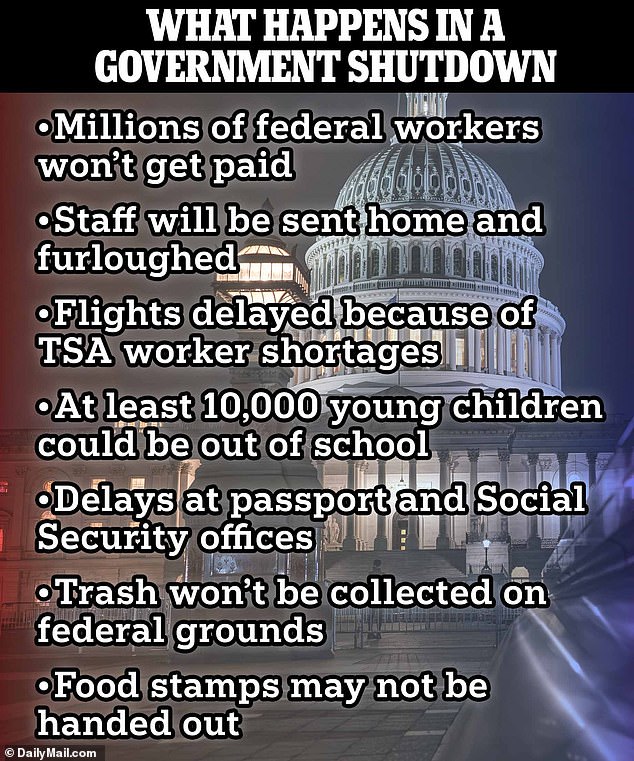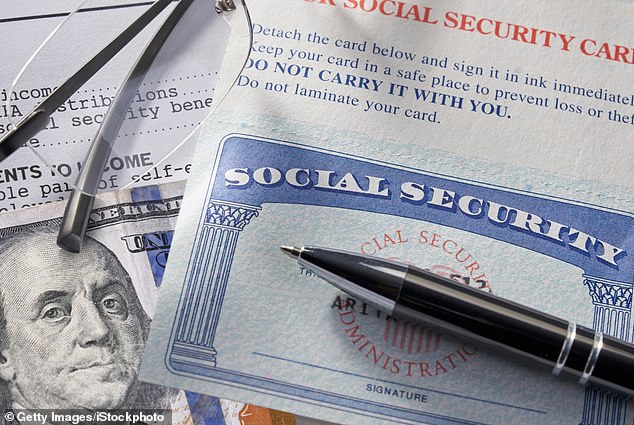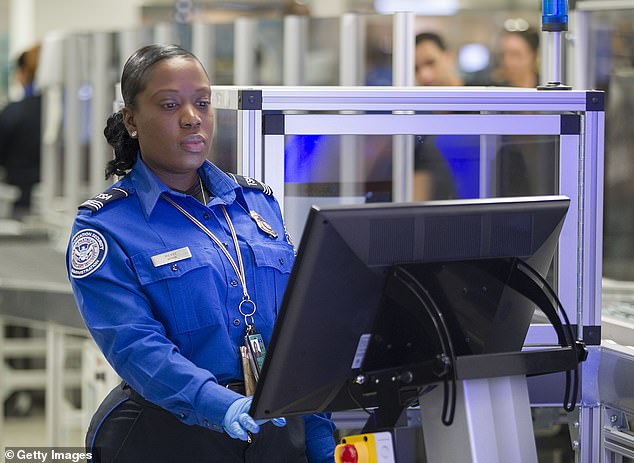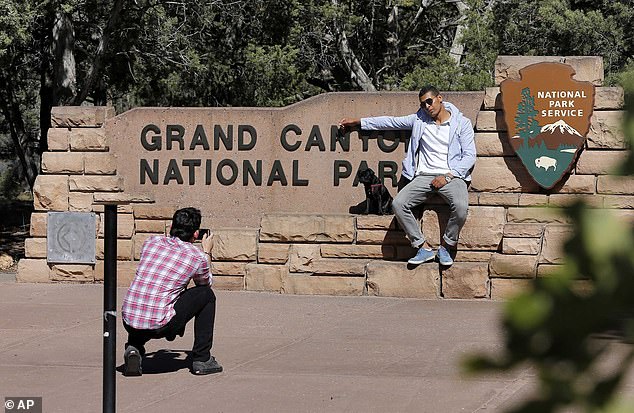As Republicans fail to pass their own bill – all but guaranteeing a shutdown – what does it mean for YOU?
Fringe Republicans on Friday vetoed Speaker Kevin McCarthy’s last-minute bid to fund the government through October 31, making a shutdown extremely likely.
With less than 36 hours until the deadline, the Republican Party is now trying to find an agreement that will prevent widespread chaos and disruption across the country.
Without funding, hundreds of thousands of state employees will be laid off and others will be expected to work without pay, leaving several government agencies stretched thin and only semi-operational.
Even though the decision is in their hands, members of Congress will still get paid during a shutdown, as will federal judges and the president. However, their staff does not.
Fringe Republicans on Friday vetoed Speaker Kevin McCarthy’s last-minute bid to fund the government through Oct. 31

Without funding, hundreds of thousands of state employees will be laid off and others are expected to work without pay. Students will not attend school because of the federal head start program
During a shutdown, many government operations come to a halt, but some are considered “essential” and continue with or without funding.
Essential congressional staffers will receive back pay. Those who are furloughed, such as janitors or cafeteria workers, will not receive pay.
From Social Security and VA benefits to air travel and national parks, how will a government shutdown affect you?
Social Security
According to experts, Social Security benefits would remain unaffected during a government shutdown, but contacting the Social Security Administration (SSA) in case of problems could be more difficult.
If lawmakers don’t find a solution by Oct. 1 and a shutdown does occur, the 66 million Social Security recipients will still receive their full federal monthly checks — which average $1,827 for retirees.
This is because Social Security is funded through permanent, rather than annual, federal appropriations.
However, the government’s plan also stated that about 14 percent of its workforce of nearly 62,000 employees would be laid off in the event of a shutdown.

The Social Security Administration’s plan also noted that about 14 percent of its workforce of nearly 62,000 workers would be laid off
Veterans benefits
Last week, Secretary of Veterans Affairs Denis McDonough noted that VA medical care and disability compensation, among other benefits, would continue in the event of a shutdown.
He also said during a press conference on Friday that some employees would be furloughed and that some offices would be closed as a result.
trip
Fortunately for travelers, most government employees involved in air travel will be retained because they are considered “necessary to protect life and property.”
The vast majority of Transportation Security Administration (TSA) agents, who are considered essential workers, are expected to work without pay. But if this continues, there may be fewer people working and longer lines at security checkpoints.
Likewise, air traffic controllers and border officials will have to work without paychecks until the shutdown ends.
Americans who need to renew their passports or attend scheduled visa services should be able to do so, as passport processing, supervised by the State Department, will continue both domestically and abroad.
According to a separate contingency plan submitted by the State Department in August, “Consular operations at home and abroad will remain 100 percent operational as long as there are sufficient reimbursements to support operations.”
A Department of Transportation contingency plan notes that more than 25,000 Federal Aviation Administration (FAA) personnel will be retained in the event of a shutdown because they are “deemed necessary to protect life and property.”

More than 95 percent of TSA agents — about 58,000 — will be hired without pay. Pictured is a TSA agent in Miami, Florida
National parks
Most national parks will close in the event of a shutdown, the Biden administration said Friday.
“In the event of a lapse in annual government appropriations, National Park Service (NPS) sites will be closed,” the Department of the Interior said in a news release.
“This means that the majority of national parks will be completely closed to the public,” the report continued.
All Smithsonian museums, including the National Zoo, would close during a shutdown.
Two states have said they will try to keep at least some of their national parks open.
Arizona and Utah will keep their national parks open if a shutdown threatens access to Utah’s Grand Canyon and Zion Valley.

Arizona and Utah will keep their national parks open if a closure threatens access to Utah’s Grand Canyon and Zion Valley
Federal programs
Speaker Kevin McCarthy has warned conservative hardliners that the impeachment inquiry into President Biden would come to a halt if a shutdown were to occur.
The White House warned that a shutdown could result in 10,000 children losing access to Head Start programs across the country, as the Department of Health and Human Services will not award grants during a shutdown.
When was the last shutdown and how long did it last?
The last shutdown lasted 34 days from December 2018 to January 2019 – the longest in history.
At that point, congressional funding for nine departments with approximately 800,000 employees ran out. According to a report from the Congressional Budget Office (CBO), the five-week partial shutdown cost the economy approximately $11 billion. After the shutdown ended, all but about $3 billion was recovered.
It also forced TSA agents out of work as they tried to find other ways to make money.
Previously, the record was 21 days during a 1995-1996 shutdown, when President Bill Clinton refused to accept Chairman Newt Gingrich’s sharp spending cuts and tax cuts.
In 2013, there was another 16-day shutdown as Republicans tried to gut the Affordable Care Act.
How many shutdowns has the US experienced?
According to the Congressional Research Service, there have been 20 gaps in funding since 1976 that lasted at least a day.
Before this, the government normally functioned even if the spending laws were not passed. Two opinions from Attorney General Benjamin Civiletti in 1980 stated that it was illegal for the government to spend money without congressional approval.
